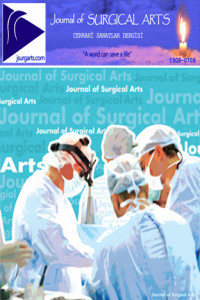Impacts of perioperative warming on vital findings and blood parameters of patients having cholecystectomy
Impacts of perioperative warming on vital findings and blood parameters of patients having cholecystectomy
This study was carried out to determine the effects of preoperative, preoperative, and postoperative warming on vital signs and blood parameters in patients undergoing laparoscopic cholecystectomy.
This study was carried out in operating room A of a research and practice hospital. Necessary permissions were obtained from the university research ethics committee, hospital, and patients. Eighty patients who had undergone medical operations in the hospital in the last six months were included in the sampling method. Body temperatures and physiological findings of the patients and room temperature were also given as percentages. Repeated measurements of variance and t-test evaluated postoperative physiological results of each patient.
The average body temperature of the patients was 36.36+ 2.81°C, and the average body temperature after the operation was 36.33+ 2.80°C (p >0.05). The mean arterial pressure (MAP) of the patients before the operation was 102.64+11.529 mm Hg. The mean arterial pressure of the patients in the recovery room after the operation was 98.55+ 9.940. During the operation, the MAP was between 96 and 98 Hg. There was a significant difference in terms of the mean arterial pressure of the patients (p 0.05).
As a result, it can be said that keeping the preoperative, preoperative, and postoperative body temperatures of the patients positively affects blood pressure, respiration, and oxygenation and help to normalize these values. In addition, it keeps erythrocyte, hemoglobin, leukocytes, lymphocytes, thrombocyte, APTT, BUN, AST, ALT values within the normal range. It contributes positively to the healing process of the wound. In order to increase the accuracy of this study, it is recommended to conduct studies that include more control and experimental groups.
Keywords:
Hypothermia heating, cholecystectomy, laboratory findings,
- ISSN: 1308-0709
- Başlangıç: 2008
- Yayıncı: Osman Nuri DİLEK
Sayıdaki Diğer Makaleler
Songül KARAKUZULU, Arzu TUNA, Ayvaz ULAŞ URGANCI
Bilateral giant inguinoscrotal hernia with hydrocele. A case report
Ozan KAYA, Elçin ERSÖZ KÖSE, Murat KAVAS, Cansel ATİNKAYA BAYTEMİR, İrfan YALÇINKAYA
Ultrasound assisted catheterization of internal jugular vein
Ahmet DOĞAN, V Melih KARA, Hacı Mehmet ODABAŞI
Pseudomyxoma peritonei presenting with port site hernia
Serkan KARAISLI, Atahan ACAR, Feyyaz GÜNGÖR, Murat Kemal ATAHAN
Vikram YOGİSH, Sugandh AROCKİYASEKAR, Akhil AVİRNENİ
Giant left atrial myxoma presenting as cerebral embolism
Funda TOR OCAK, Muhittin Zafer SAMSA
Pleurodesis methods in the surgical treatment of primary spontaneous pneumothorax
